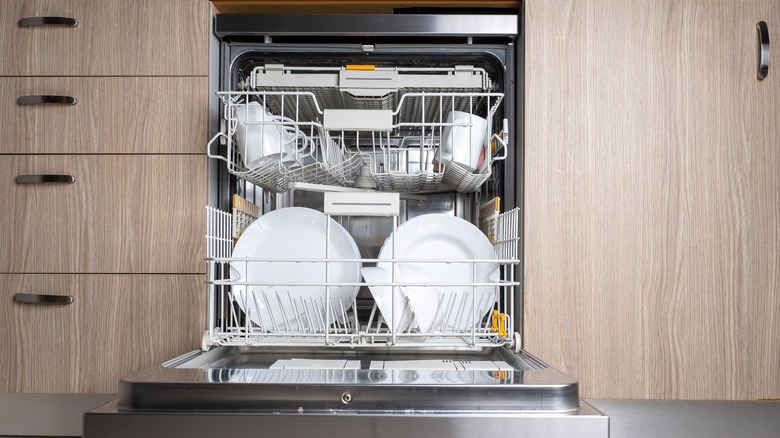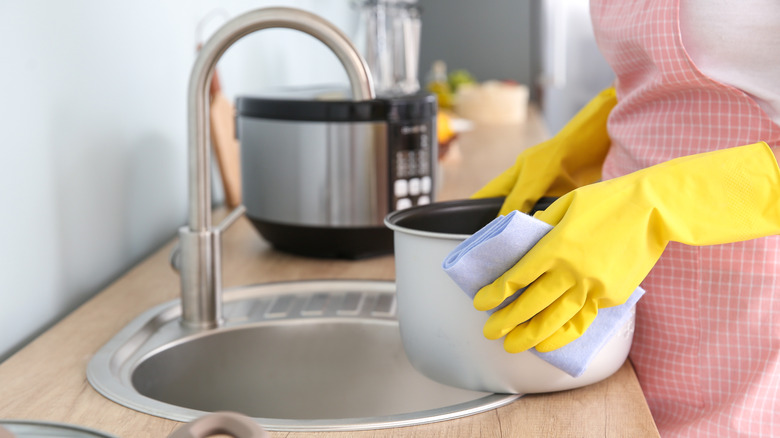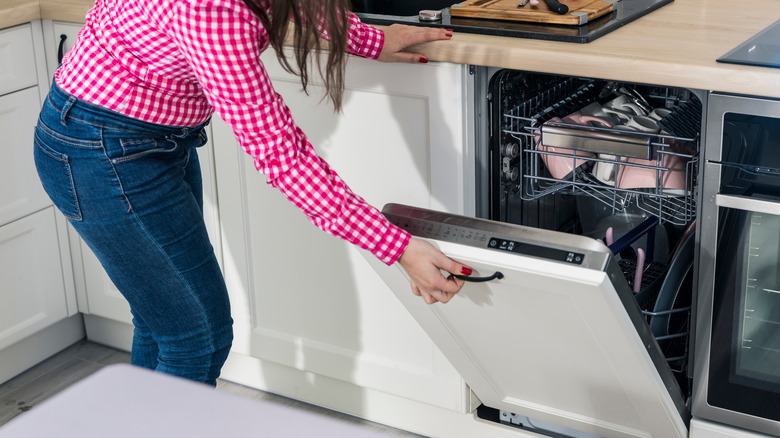Can You Wash A Slow Cooker In The Dishwasher?
A good slow cooker can be an invaluable cooking aid in your kitchen. From hearty stews to steamy dips and mouth-watering pulled pork, there are seemingly endless recipes that can be created with minimal time spent on the actual cooking side. In the 1940s, inventor Irving Naxon was able to create and patent a cooking device that could spread heat evenly throughout the pot and allow for a gradual cooking process that wouldn't have to be constantly monitored, according to CNET. Over time the Naxon Beanery — as the original appliance was called — was purchased by Rival Manufacturing and, in the 1970s, was updated and re-released with the name we are familiar with today, the Crock-Pot.
The Crock-Pot became a staple in post-war households as busy working families needed alternative solutions for dinner that would require less time in the kitchen. With plenty of recipe options, the slow cooker allowed home cooks to prepare ingredients in the morning and leave everything to cook slowly at a lower temperature throughout the day. This low and slow method of cooking ensured that by the time dinner rolled around, your meal would be ready for you. Luckily, this style of cooking also meant that there would be less time spent on cleaning a variety of messy pots and pans. The slow cooker has since evolved into more sophisticated models that offer smart cooking technologies, but we'll take a look to see if the clean-up remains just as simple.
Ways to clean your slow cooker
Once you have finished an amazing meal from one of your slow cooker recipes, it's time for the all-important yet groan-worthy clean-up. However, before you get too downtrodden, know that cleaning your slow cooker can be quite easy. First, and most important, you should always be sure to hold off on washing the appliance until it has fully cooled down. This way you avoid the risk of burning yourself or cracking the pot itself. If you are the type of person who doesn't mind getting their hands dirty then you can simply wash the inner stoneware of your slow cooker in a sink with warm water and a few drops of dish soap, according to Crock-Pot.com. Although the removable stoneware can seem quite durable, you still want to make sure that you are not using steel wool or an abrasive sponge to get the gunk out. Instead, a soft sponge or dish brush should do the trick without scratching the material.
For a deeper clean you can use the heating power of your slow cooker to essentially clean itself. Pour water into your slow cooker up to the food line, then add a half cup to a full cup of vinegar plus equal parts baking soda. Once the fizzing has come to a stop, pop the lid on and set your slow cooker to the lowest temperature for about an hour. Once done, you'll be able to wipe the mess easily with a sponge.
Can your slow cooker be washed in the dishwasher?
If life is just too busy for you to be bothered hand washing your slow cooker and you are looking for an easier way to clean up, then there just might be a trick that will save you time and energy. Fortunately, the parts that are the most prone to greasy or sticky after-dinner messes are safe to clean in your dishwasher. Slow cookers have two main components; a removable insert made of ceramic, stoneware, or aluminum, which is typically covered by a glass lid, and an outer casing which generates the heat. This can be made of different materials, but within its make-up are electrical components including the cord that plugs into your wall.
Under no circumstances should the outer casing be placed in your dishwasher, according to Frigidaire. Instead, if splatters or a little mess lands on this component, you can wipe it clean with a moist cloth or paper towel. However, the inner cookware and the glass lid can be conveniently cleaned in your dishwasher. Just be sure that they are placed carefully in your dishwashing unit and kept away from other items which may bump and bang against them while they go through the washing cycle. The last thing you want is to pull your slow cooker out of the dishwasher to find that it's been cracked by an unbalanced plate or scratched by a wayward knife.


